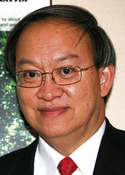Returning officer
27 October 2007SK Tham has taken up a new post in Malaysia. He talks to Keren Fallwell about the developments he saw during his 12 years in the Malaysian Timber Council’s London office
Summary
• Mr Tham is now the MTC’s senior director for trade and marketing, based in Kuala Lumpur.
• During the past 12 years, Europe has become an important market.
• In that time the focus has moved from boycotts to certification and value adding.
When SK Tham arrived in London 12 years ago to take up his post with the Malaysian Timber Council, perceptions of tropical timber were very different from today.
“There was a big anti-tropical timber boycott; no-one was talking about certification,” he said.
But now, as Mr Tham settles into his new job as senior director for trade promotion and marketing based at MTC’s head office in Kuala Lumpur, he looks back on the achievements of the past 12 years with satisfaction.
While admitting that it was “quite a challenge” to change the anti-tropical timber perspective, a programme of educating journalists, promoting Malaysia and its forestry practices and developing the country’s certification scheme helped to change opinion.
One of the key points addressed by the MTC was the claim that not using tropical timber saved the forests. “That argument is flawed,” said Mr Tham. “Boycotts encourage a shift away from timber to use forests for oil palm; land becomes more important for other uses such as agriculture. If we want to save the rainforests we have to use them in a sustainable way.”
The development of certification schemes has helped to prove that tropical timbers can be managed sustainably. It hasn’t been an easy road and Mr Tham thinks the International Tropical Timber Organisation missed an opportunity to develop a scheme for tropical timber that would have helped the process. While some governments do not like being told what to do, Mr Tham believes an ITTO scheme would have been more acceptable.
He believes competition between the various schemes has wasted “a lot of time and effort” and created confusion among consumers; he welcomes the government’s Central Point of Expertise on Timber (CPET) and the guidance it provides. “CPET is good, as long as it remains objective,” he said.
Of the five schemes assessed by CPET, Malaysia’s remains the only one recognised as proof of legality, but not of sustainability. However, Mr Tham said the Malaysian Timber Certification Council (MTCC) is quick to point out to critics that the scheme is rigorous and its standards are compatible with those of the Forest Stewardship Council.
Once the scheme was fully implemented he hoped that CPET would review it and recognise it as proof of sustainability, and added that the MTCC would soon be submitting the scheme to PEFC for mutual recognition.
While some might not agree, said Mr Tham, Malaysian forest management was sustainable and the country’s practices were among the best of topical timber producers.
“We are not perfect; there are still illegal loggers, but when they are found they are dealt with. We’ve stopped importing from Indonesia and we’ve stepped up controls.” He likened this to any government’s battle to halt illicit trade across borders. “All we can do is be vigilant,” he said.
Back in 1995 Malaysia’s main markets for timber were the US and Japan but in the intervening years the EU has become much more important. Through marketing, the MTC has established good working relationships with European markets and that, coupled with a stronger emphasis on processed products, led to the value of Malaysia’s exports doubling in 10 years. From 1995-2005 plywood exports to the EU rose from M$114m to M$253m; joinery rose from M$128.8m to M$294m; and mouldings nearly doubled from M$103.5m to M$202.2m. However, it is furniture that has made the biggest gains – from M$156.5m in 1995 to M$1.091bn in 2005.
Downstream production
Mr Tham would like to see this focus on downstream production continue, citing Lamtec laminated wood as an example of what can be achieved. Two German companies are manufacturing the product, which is made from laminated Malaysian timber scantlings, is uniform in colour, MTCC certified and has a 10-year guarantee.
Malaysia is also promoting lesser known species, such as gurutu and bintangor, in order to reduce the focus on meranti, and putting energy into plantations established on waste land.
“We hope we can increase production of timber and encourage Malaysia to become a timber processor,” said Mr Tham. “We’re buying wood from Europe, New Zealand and the US so the trend is that Malaysia is becoming a timber importer.”
In his new role, Europe will remain a focus for Mr Tham, building on the work that he and his staff in the London office have done over the past 12 years.
“I’m proud of the MTC and that Malaysian timber is known throughout Europe,” he said. “Not many people dealing in tropical timber will not have heard of MTC.”
There are many things about living in London and Europe that Mr Tham will miss – the variation in the seasons, the parks, the theatre, the skiing which was a regular Christmas holiday for the past four years, and the many friends he’s made in the timber industry. However, having spent 10 years as a trade commissioner in Moscow, Brazil and Venezuela before coming to London, it is time to return to Malaysia.
“I’ve never lived in the house that I bought,” said Mr Tham. “It’s time to put down some roots.”
